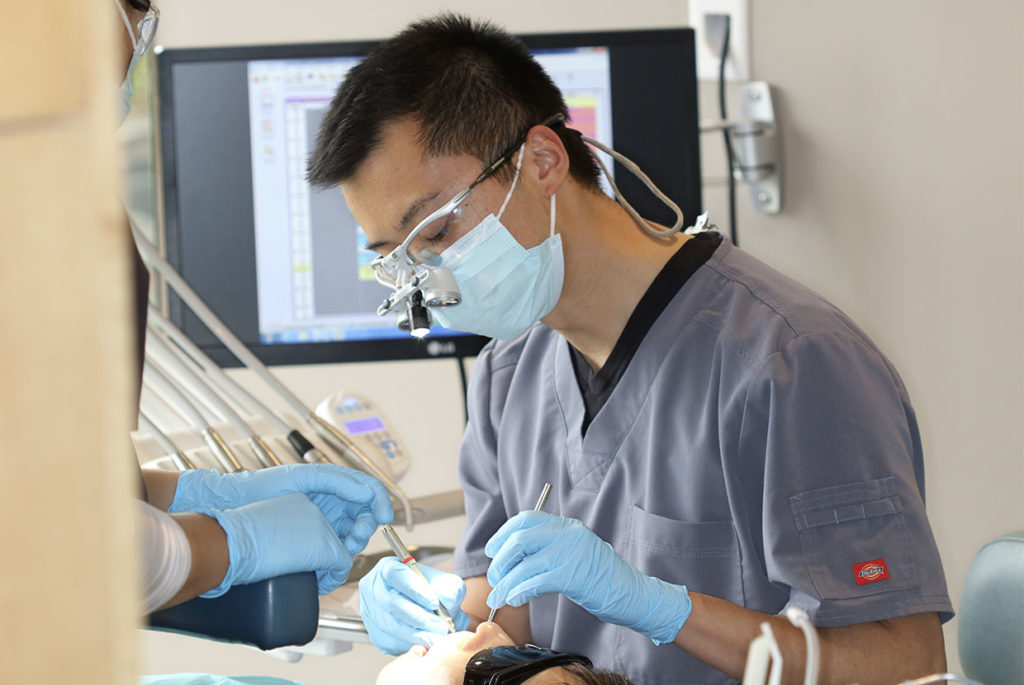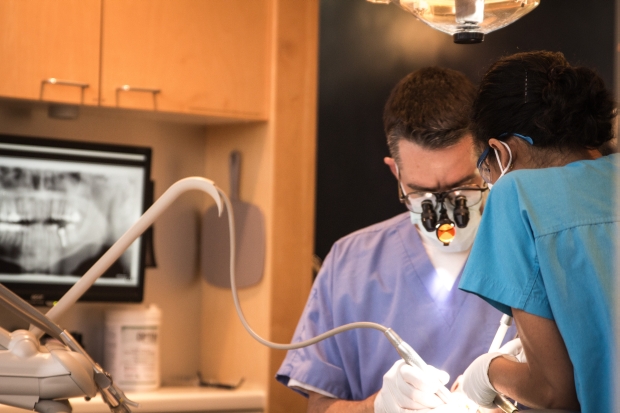Dental Hygiene
Hygiene visits are your regular dental visits, ranging from normally every 6 months to every 3 months (depending on your susceptibility to gum disease or bone loss).



What to expect during your hygiene visit...
Hygiene visits are your regular dental visits, ranging from normally every 6 months to every 3 months (depending on your susceptibility to gum disease or bone loss).
During each hygiene visit, we will update your medical and dental history. Once a year (and more frequently if needed), we will measure your gum pocket depths (because of how the depth relates to ability to disrupt plaque and prevent inflammation) and recession levels, as a measure of how healthy your gums and bone levels are. We will also do an extra-oral and intra-oral exam oral cancer screening. Digital x-rays are updated at the suggested frequency of 6 months to 2 years with the recommended frequency depending on your susceptibility for cavities and/or bone loss.
For people with sensitive teeth (we have patients who used to dread their hygiene visits), we offer a paint-on desensitizer for sensitive root surfaces and/or localized numbing without injection (Cetacaine). If needed, local anesthetic for numbing is also available.
Why do I need a cleaning so frequently?
Day to day, food particles collect on the surface of and between your teeth. These particles mix with the naturally-occurring bacteria in your mouth and clump together. When you brush your teeth, you are mechanically disturbing the clumps on the tooth surface so that they are washed off. When you floss, you do the same for in between your teeth where the toothbrush bristles can’t reach. Depending on how deep your gum pockets are, these clumps of food/bacteria can form progressively deeper, in areas your toothbrush/floss can’t reach.
These clumps are soft to begin with (“plaque”) but over the course of 24 to 48 hours, they absorb minerals and become harder (“tartar / calculus”), to the point that brushing/flossing can’t get them off. Hence, the need to floss once a day (while the plaque is still soft). Not only are you removing food stuck between teeth, you are also disturbing the formation of the calculus and related change in the microflora from healthy bacteria to more aggressive pathogenic bacteria.
The calculus, being a collection of more aggressive bacteria, causes inflammation, leading to bleeding / puffy gums and possibly bone loss. Puffy gums lead to deeper gum pockets, making these areas even harder to reach to disrupt the bacteria. Over 40% of the population is susceptible to the inflammation causing bone loss.
Unfortunately, bone loss does not present with pain as a warning sign. It does not hurt, until the bone loss is so advanced that your teeth becomes loose/mobile.
Thus your daily disruption of the bacteria at home, through careful brushing and flossing is the best way to prevent inflammation and possible bone loss. It can also have positive effects on your systemic health as the literature is showing clear links between these pathogens and heart disease.
What we do different at the Marshall Clinic
Hygiene visits at most dental offices are set in 1 hour increments. While this makes it easier to schedule for the receptionist, the hygienists at times struggle to complete all the procedures they set out to do, including annual gum pocket / recession assessments, scaling / root planning, oral hygiene instructions/recommendations, and others. In cases of deeper pocketing, if a thorough debridement is incomplete, then the buildup and inflammation can return faster than anticipated. Finally, if a dentist comes into the operatory and does a recall/recare exam during that 1 hour, this further cuts down the actual time available for the hygienist.
At the Marshall Clinic, we find it helpful to customize the length and frequency of the hygiene appointments, ranging from 45 min to 1.5 hours, every 3 to 6 months, based on a patient’s susceptibility to gum disease. By allocating more time for the appointment, our hygienists have the opportunity to provide a more thorough service and dentists have the time they need to do a thorough recall/recare exam. In cases where a patient has not seen a hygienist for a long time, by completing the hygiene session in 1.5 hour appointment, it also saves the patient from having two single visits of 1-hour appointments.

